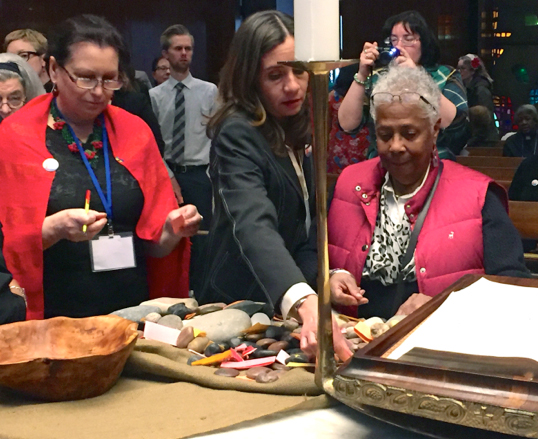Activated Again!

Again, I have been activated by the Holy Spirit to fill my cup from the many issues at the UN Commission on the Status of Women. It is always a pleasure to be included in this wonderful learning experience. Although I had not attended in a couple of years, attending the 60th session (in March this year) was still a journey of excitement, meeting and greeting women from all over the world. Being part of the advocacy team is an opportunity to share information with other countries, as well as to bring forth voices of all women. And attending the NGO events that run parallel to the official session of the Commission gives me a more informed outlook on issues.
I no longer think domestic violence is just in the household; intimate partner violence can happen in any venue. The “Domestic Violence at the Work Place” panel opened my eyes to the fact that whatever happens at home can show up at work; it can be physical abuse or a threat. This can create a health and safety risk to other workers as well as the person who is being threatened. The employer and employee are responsible for each other and the safety of all workers. Governments have lobbied to address this issue by creating centers on violence against women and girls, training men and boys, and holding the employer responsible for security measures such as not publishing emails, telephone numbers and other identifiers. Egyptian legislators are acting on a two-year victim leave. Transgender people have a higher ratio of being victims of intimate partner violence.
Another thought-provoking panel, “When Home Is Where the Harm Is: Family Law Reform to Challenge Gender-Based Violence,” was held in the New School in lower Manhattan. I learned that in some countries, laws are governed by religion. For example, you follow laws of your religion; however, some individuals can change their religion to be free of the crime.
In some countries, women are struggling with police arresting young girls, then selling their bodies. The solutions include women becoming police officials so they can have a seat at the decision-making and policy-making table.
In one of the NGO briefings, the word all in front of the word women was a big debate among the attendees at the briefing. The debate ended when the facilitators left the room without side conversations. The only reason they gave was that it was too late to change the agreed conclusion.
This year I walked away from CSW60 with remarks made by then-director of the PC(USA)’s UN office Mark Koenig. He said, “The task of advocacy has nothing to do with giving voice to the voiceless, because all people have voices. Some people have voices we choose not to hear. Some people have voices we ignore. Some people have voices we force to the margins. Some people have voices we oppress, repress and suppress. Some people have voices we have silenced, sometimes for a long time, but all people have voices.” May we be a voice for those who have been silenced.
Editor’s note: The 60th session of the UN Commission on the Status of Women was held in New York City March 14–24, 2016. Representatives of UN Member States, UN entities and ECOSOC-accredited non-governmental organizations (NGOs) from all regions of the world attend the session. Hundreds of parallel events are organized by the NGO Committee on the Status of Women. Independent from the UN, the NGO CSW Forum gives activists from around the world the opportunity to discuss issues pertaining to women and girls, to network, share strategies/good practices, and to lobby governments to implement resolutions and treaties.
About the author: Alpha Brown is justice and peace chair for PW in the Synod of the Northeast.
